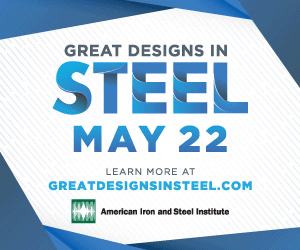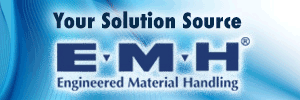2012 State of the Industry: Metal Forming & Fabricating Machine Tools
Forecast: Advanced technology and automation will keep this business sector strong overall and growing in the agriculture, transportation, medical, aerospace, and oil and gas sectors.
Posted: January 9, 2012
 Rolf Biekert
Rolf Biekert
President and CEO, TRUMPF, Inc.
This manufacturer of precision sheet metal fabrication equipment and industrial lasers is the North American subsidiary of TRUMPF GmbH + Co. KG (Stuttgart, Germany).
CURRENT STATE OF BUSINESS
Last fiscal year, which ended June 30, 2011, saw our business in North America experience its second-best year ever, with sales revenues totaling $375 million. This represents a 52 percent gain over the previous fiscal year’s sales. Of course, the big question is: How will we fare in the future? This is never an easy question to answer, but it is especially difficult to put one’s finger on the pulse of the future because the world’s markets are in such a state of flux.
In many of our key markets we are seeing growth. However, along with the growth comes uncertainty. Issues such as the currency crisis, the jobs market and lack of available employees with specific qualifications all have the potential to significantly and adversely impact our business. The company’s new fiscal year, which began July 1, started off on a high note. The order situation was very strong. But over the past few months, orders have stabilized and growth has not been as high.
That being said, the orders have stabilized at a fairly high level, and despite the risks I mentioned earlier, we believe that we will remain on a clear course for further growth in the current fiscal year. We are seeing a lot of activity in Russia, Germany, Brazil, and of course the U.S. The market sectors in which we’re seeing significant growth is agriculture. Also, more than half of our business is conducted with sheet metal fabrication shops. We see significant opportunities in the agricultural and transportation industries, as well as in energy and medical.
MAJOR TRENDS
Out of necessity, fabricators are moving away from areas of specialization and becoming generalists. Market demands are shifting from “parts supplier” to “component manufacturer” to reduce complexity and logistic costs.
Advancements in technology are allowing fabricators to think and operate outside of the box. For example, over the last two years ago laser cutting systems have become available that allow fabricators to easily add laser cutting to their in-house services and opens the door for them to pursue new business opportunities. Punch-laser combination machines are another important development, because they combine the best of both worlds: scratch free punching and laser processing. These high-end machines meet the most stringent demands for part quality, productivity and flexibility.
We also expect the trend in automation to continue – and grow. This is mainly being driven by the lack of qualified people in the market and the increased labor costs over the last years. Automation allows manufacturers to run unattended shifts and therefore increase productivity and shorten return on investments overall.
CRITICAL ISSUES
There is one critical factor that seems to overshadow all of the other issues, and that is the uncertainty of the economic outlook and the currency crisis. Our strategy for dealing with this is to continue to conduct our business as we have throughout the economic crisis. We will remain highly flexible with our production process and adjust capacity accordingly. These measures form a good basis for keeping us prepared to deal with fluctuations in the marketplace.
Another critical issue facing the industry is the lack of skilled employees. This is a big problem, not only in the U.S., but globally. There are jobs just waiting to be filled, but prospective employees lack the necessary qualifications. Like many other companies, we have taken matters into our own hands by training people who exhibit those attributes that we consider integral to being a good employee: aptitude and a willingness to learn, enthusiasm for the job and a strong work ethic. If people possess these fundamentals, then we can train them on the technology.
PERSONAL INSIGHTS
We must continue to work with government officials to relax the rules and regulations that prohibit U.S. manufacturers from being competitive in the global marketplace. It is important that we continually communicate with our elected officials and let them know our concerns. We must write them, phone them, visit them in person – and, in turn, invite them into our factories. We cannot just cast a vote, sit back and watch events unfold. Our responsibilities extend beyond that, and we must fully participate in our role as citizens by actively expressing our concerns and preferences.
TRUMPF Inc., 111 Hyde Road, Farmington, CT 06032, 860-255-6000, Fax: 860-255-6424, info@us.trumpf.com, www.us.trumpf.com.
 Steve Lazinsky
Steve Lazinsky
President, COMEQ, Inc.
Distributor providing sales, service, and parts for hydraulic ironworkers, plate and sheet bending rolls, angle bending rolls, hydraulic press brakes and other equipment.
CURRENT STATE OF BUSINESS
The short answer is that business is stable for now, but unfortunately, a broader profile reflects that we in the machine tool sales industry are still either trying to recover, or are recovering from, the large drop in sales related to the Great Recession. The positive news is that the reports we are now receiving from our sales staff and our distributors tell us that many sheet metal and steel fabricators are busy. Their activity level has definitely increased over the last several months.
Manufacturers of their own products have been busy here in the U.S. and now it seems that this activity is spreading to general fabricators and job shops as well. Plate fabricators are busier right now than structural fabricators.
MAJOR TRENDS
Activity levels are the highest in the areas of automation. This has been true for the last five years or so. While this type of activity may not necessarily be good for the jobs reports on employment, machine tool buyers are specifically addressing the payback they can get with automated products.
This means that distributors must attempt to present each customer with a complete range of options that is available when considering a machine. The process should start with a basic model that matches the customer’s skill set, but then critique and develop the unique options that are available to push that system into higher productivity, including any automation.
If a distributor can show a customer how they can justify automating a piece of standard equipment, there is a good chance of closing that sale. These sorts of systems upgrades are important since the overall consensus among most in the business is that the metalworking market is in for a period of flat growth this year.
CRITICAL ISSUES
The banking situation is a critical issue. It is, without question, more difficult to maintain or establish a line of credit today. Many companies in the industry have lost money over the last couple of years. This means that no matter what assets they have built in their business or are available to the business owners, these companies simply do not have the financial flexibility available that they held before. Because of this, investors are leery of any opportunities because they want to hold on to any cash they have available.
This means that the success of most manufacturers and selling companies will depend on the availability of capital. The lack of capital availability makes it more important for a customer to work with a machine tool sales company and/or a financial institution that truly understands their industry – and thus their real needs. If a company is purchasing machine tools, it is critical to work with a very experienced sales person and a selling company that understands not only the equipment being purchased, but other items, such as after sales service and alternative financing options that are available.
When attempting to sell conventional equipment in the past, many machine tool builders have produced machines for inventory. But because lines of credit are tight, I do not believe that this concept is as popular today as it once was. This means that customers should try and plan as far in advance as possible for their machinery needs. We try to work with our customers on the complete package of the machine tool sale by spending time educating them, not only by discussing the technical requirements of the machine, but also what might be considered incidental items, such as financing freight and rigging. For many customers, using third-party leasing companies or finance companies is a good alternative to using their own bank.
Distributors must also try to evaluate which machines should be kept in stock so that customers will have greater flexibility at the time that they actually need a product. This is certainly more difficult to do with the more automated equipment, but with standard machines we have a lot of flexibility.
PERSONAL INSIGHTS
While I know that our neighbors down the street in Washington DC are trying to stimulate the economy, I truly believe that an increase in manufacturing will be substantially driven by the simple fact that there is only so long that anyone can continue to do “bubblegum maintenance” on their vehicles, their machines, on bridges or machine tools, or on other items before they have to replace them.
This makes it more important than ever for a customer to be able to communicate openly and honestly with his supplier. The same is true in the reverse direction. This way each party can achieve their same goals. The relationship does not end the day the machine is paid for . . . it lasts as long as the customer has the machine.
Regarding skilled labor, everyone complains that is difficult to find qualified employees. While the newer machines simplify the use and operation of the equipment, it is still critical to possess some basic knowledge about the product being worked on. In most cases the purchase of an automated machine will provide the results expected, but it is essential that the supplier of the product being considered have an understanding of the customer’s requirements.
Backup service and proper training are keys to the use of automated products. The purchaser must share information as to his requirements with the supplier, and the supplier must be candid with the customer as to what to really expect. With this in mind, a purchaser should be able to make a decision that will yield a much quicker return on his investment.
COMEQ, Inc., 10521 Industrial Park East Road, White Marsh, MD 21162, 410-933-8500, Fax: 410-933-1600, sales@comeq.com, www.comeq.com.










